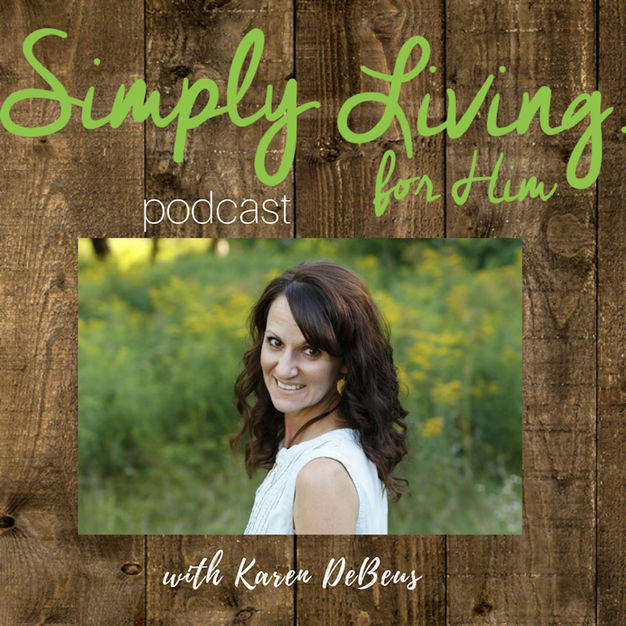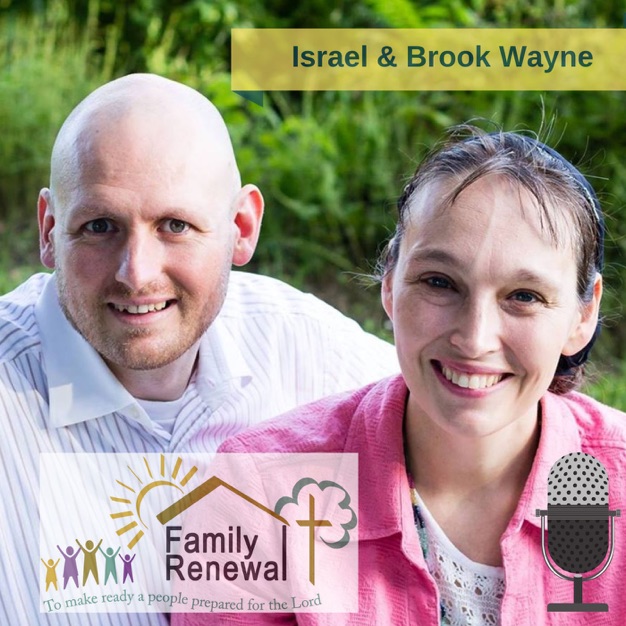
Making Biblical Family Life Practical
Hal Young and Melanie Young
Family Values & Homeschool Help
- 29 minutes 41 secondsMBFLP – Romance Once You’ve Got Kids (Replay)
Romance Once You’ve Got Kids
Valentine’s Day is on the horizon and for parents with small children, no money for a sitter, and no relatives nearby, the response might be “So what?” It can be discouraging when the world is full of ads urging dinner out, expensive jewelry, and barrels of roses, when your life is more about diapers and phonics, and your budget is more of the dollar menu and less of filet mignon. This episode, we talk about finding romance in real life, wherever it may be – and sometimes, it will surprise you where it can be found!
Sponsored by Now Programs.
Show Notes for Romance Once You’ve Got Kids
Valentine’s Day is just around the corner—a time traditionally associated with grand gestures, candlelit dinners, and extravagant gifts. But what happens when you’re knee-deep in diapers, laundry, and homeschooling? Is romance doomed to take a backseat?
If this sounds familiar, don’t worry—you’re not alone. Many parents of young children feel the pressure of balancing family life with maintaining a strong and loving marriage. The good news? Romance doesn’t have to disappear—it just needs to look a little different.
Redefining Expectations
When you have small children, it’s easy to feel disconnected from the glittering Valentine’s Day ads showcasing fine dining and luxury gifts. Between budget constraints, finding babysitters, and the sheer exhaustion of parenting, these expectations can feel out of reach. But here’s the truth: Romance isn’t about meeting societal standards. It’s about strengthening your bond as a couple and celebrating the love God has given you.
As Hal and Melanie Young point out in their podcast Making Biblical Family Life Practical, the key is to focus on your relationship—not on what the world says it should look like. You don’t have to please anyone except each other and God.
Finding Creative Ways to Celebrate
Even with young children underfoot, you can create meaningful moments of connection. Here are a few ideas from Hal and Melanie to keep the spark alive:
- Homemade Valentine’s Cards
Involve your children by making cards together. Not only is this budget-friendly, but it’s also a way to include your family in the celebration. Bonus: Crafting cards for each other can become a sweet and personal tradition. - Date Nights at Home
If going out isn’t an option, create a special evening at home. Put the kids to bed early or let them have a movie night in another room while you enjoy a candlelit dinner for two. - Romantic Nostalgia
Revisit your wedding video, flip through old photo albums, or retell your love story to your kids. It’s a beautiful way to honor your history and show your children the foundation of your family. - Parent Swaps or Babysitting Trades
Partner with trusted friends or family members to trade babysitting duties. This can free up time for you and your spouse to reconnect without distractions.
Building Romance Daily
True romance is about more than a single day on the calendar. It’s cultivated through small, consistent acts of love and kindness. Simple gestures like leaving a note, offering a sincere compliment, or cooking your spouse’s favorite meal can go a long way in keeping your connection strong.
Hal and Melanie emphasize the importance of trust and selflessness in marriage. As they shared, “Trust is built through a long sequence of consideration, courtesy, and self-sacrifice.” These everyday acts create a bond that’s deeper and more enduring than any store-bought gift.
Letting Your Kids Witness Love
It’s good for your children to see your affection and appreciation for each other. Whether it’s a quick hug in the kitchen or sharing a laugh at the dinner table, these moments show your kids that marriage is joyful, loving, and worth celebrating. You’re modeling a biblical and healthy relationship for them to aspire to in their own lives.
Embracing the Season You’re In
Parenting young children is one of the busiest, most demanding seasons of life. It’s okay to be creative and flexible with how you celebrate romance. This season will pass quickly, and there will be opportunities for grand getaways and fancy dinners in the future. For now, focus on maintaining and nurturing your relationship in the ways that matter most.
As Hal wisely advises, “Find romance where you can—whether it’s during the kids’ nap time or over coffee in the early morning.” The important thing is to stay connected and enjoy the journey together.
Bonus Resource
Looking for more tips on rekindling romance during the busy parenting years? Download Hal and Melanie’s workshop Romance for the Exhausted at raisingrealmen.com/valentines-day-freebie. You’ll also find a special Valentine’s Day deal featuring their book My Beloved, My Friend and other marriage-strengthening resources.
The post MBFLP – Romance Once You’ve Got Kids (Replay) appeared first on Ultimate Homeschool Podcast Network.
Click the icon below to listen.





 7 January 2025, 3:35 pm
7 January 2025, 3:35 pm - Homemade Valentine’s Cards
- Gift Giving in a Big Family – MBFLP 273 (Replay)
Biblical Gift Giving
This week we’re talking about gift giving – it’s Biblical, you know! But how do you manage it without being immersed in the commercialism of a secular holiday, while glorifying God and having fun together? We’ve found that being more intentional and deliberate in choosing gifts and even in how we open them together, and encouraging our children to think of people rather than stuff at Christmas, has great benefits!
Biblical Passages We Mentioned
The wise men who brought gifts to Jesus – Matthew 2:1-11
The people feasted and shared with each other over joy in God’s word – Nehemiah 8:9-10 – And Nehemiah, who was the governor, Ezra the priest and scribe, and the Levites who taught the people said to all the people, “This day is holy to the LORD your God … Go your way, eat the fat, drink the sweet, and send portions to those for whom nothing is prepared; for this day is holy to our Lord. Do not sorrow, for the joy of the LORD is your strength.”How Our Family Christmas List is Structured
We described how our family keeps up with everyone’s “wish list” – not just at Christmas, but all year long! Here’s the basic framework – each person’s section of the family list is divided into price brackets, and it’s the responsibility of each person to keep their list up to date. And when the shopping happens, gift-givers quietly delete items so others don’t duplicate their gift!
NAME
Updated: (be sure to make a note here when you make changes to your list!)
- $1-$5 Gifts: Your categories may differ, depending on the ages in your family and your personal budgets. We have to consider young children, teenagers, college students, and adults of all sorts.
- $5-$15 Gifts: If you have specific items in mind, you might include links to places these might be found. Many in our families are avid readers, so we often have lists of books here – and links to Amazon.com or Thriftbooks.com to make it easy
- $15-$30 Gifts: Grown-up level
- Big Gifts: Because you never know when someone might find a great deal, or several people collaborate
- Crafts, Work, and Services: Busy people may appreciate help with a particular hard-to-schedule need. One of Hal’s hopes last year was for help replacing our garage door – and two of our adult sons came over and made a weekend project of it!
Thank you to the Ultimate Homeschool Podcast Network sponsor, NOW Programs.
The post Gift Giving in a Big Family – MBFLP 273 (Replay) appeared first on Ultimate Homeschool Podcast Network.
Click the icon below to listen.





 10 December 2024, 4:33 pm
10 December 2024, 4:33 pm - Surviving the Break with Your College Students – MBFLP 287 (Replay)
The holidays are upon us and we are looking forward to having our college students home again! But to be realistic, there’s always a transition to bringing our young adults back into the household – and often both the student and the family ends up frustrated. This episode we’re talking about things you can do – on both sides – to make the visit as smooth and pleasant as possible for everyone!
Parent Understanding
If you went to college, you remember the rush of exam week – and the mental and physical exhaustion at the end of it! Especially at Christmas and the end of the spring semester, your student will be arriving after a really tough week or two. We try to keep that in mind for their first several days home.
Expectations
Our unspoken hopes and preferences can set us up for disappointment and conflict. Maybe we parents look forward to seeing our young adult, but we’re also looking forward having his help around the house again! For his side, maybe he’s hoping for some relaxation from the stress of college — or possibly, he has projects or homework to finish during his holiday. Maybe the younger siblings want a lot of attention from their big sister, when she really needs some peace and personal space – at least at first.
The best way to deal with these issues is to communicate ahead of time – gently, in love – and be willing to listen to one other and seek to accommodate everyone. All of those expectations are common and valid – the difficulty is how to address them all. If we cultivate patience and understanding together, we can probably find a mutually agreeable pathway.
Changing Channels
When Hal was working a corporate job, he had to remind himself on the commute home, “I have to leave the office door closed behind me and put on my family hat now.” No matter what stress or disaster he’d left at work, when he came in the door, he knew the kids would be excited to see him, Melanie would be tired and need compassion, and he’d have to be ready to show love and concern to everyone at home.
Our college students need to think about that, too. While they’re making the trip home, they need to consciously prepare themselves to be part of the family culture at the end of their trip. The way they live or even just survive on campus is a separate issue to what happens at home — and they need to change gears before they get here.
In both cases there will be time and opportunity to share their struggles and disappointments, to seek advice and sympathy, but that will come after the initial rush of returning. Everyone will be happier at the end if the wanderer is ready to greet and be greeted first, and then seek the serious conversations after!
We dig deeper into the questions in our blog post here
Thanks to our sponsor! NowPrograms.com – visit the website for more information.
The post Surviving the Break with Your College Students – MBFLP 287 (Replay) appeared first on Ultimate Homeschool Podcast Network.
Click the icon below to listen.





 8 November 2024, 5:53 pm
8 November 2024, 5:53 pm - 18 minutes 29 secondsGetting Your Kids Field Trip-Ready! – MBFLP 309
We’ve all been there – trying to enjoy a museum, historic site, or some other exhibition, but the visit is distracted – or ruined – by children running amok. What can we do about our own kids, so they get the benefit of a field trip, and not become spoilers for other visitors?
Recently we read about a young boy who accidentally broke an ancient jar in an Israeli museum. He wasn’t being disrespectful or even disruptive – just curious. But his natural curiousity had awful results …
So how can we prepare our children to visit grown-up-oriented events and learn from the experience, while behaving in a respectful and quiet manner that’s courteous toward others?
We’ve got eight children, and as much as possible, we’ve taken them wherever we go. We’ve been everywhere from the Gettysburg battlefield to art museums in China with kids of all ages – but the key is preparation! This episode we’re talking about positive steps we’ve done ahead of time, and some parenting hacks while we’re on site, that have made this possible. It can be done!
You May Find Interesting
Boy accidentally smashes 3500-year-old jar on museum visit
BBC News: Jack Burgess – 27 Aug 2024Boy … welcomed back to museum
Associated Press via CNN.com – 2 Sep 2024Children in “Big Church”
Making Biblical Family Life Practical – Ep. 218The post Getting Your Kids Field Trip-Ready! – MBFLP 309 appeared first on Ultimate Homeschool Podcast Network.
Click the icon below to listen.





 24 October 2024, 1:00 am
24 October 2024, 1:00 am - 21 minutes 1 secondBringing History to Life! – MBFLP 296
We’ve seen that understanding history can help us navigate the present, too! The question is, how can we help our children learn to appreciate history like we do? What can we do to spark their interest, to make it memorable, and bring it to life for them? This episode we talk about several things we’ve built into our homeschooling family life to elevate history from dry lists of names and dates to a lively narrative of people, places, and ideas – in short, a grand story!
Thanks to our sponsor CTC Math. CTC is a highly rated math curriculum for homeschooled students for grades K-12. The family math package makes it ideal for large families at a low price. Visit the website for more information.
The post Bringing History to Life! – MBFLP 296 appeared first on Ultimate Homeschool Podcast Network.
Click the icon below to listen.





 18 October 2024, 5:00 pm
18 October 2024, 5:00 pm - Dealing with Stressful News – MBFLP Replay
Some things are unquestionable, life-changing moments – an unexpected death in the family, a natural disaster, a major accident. But what about things which just show up and disrupt everything? The smaller emergencies which aren’t big enough to awaken heroism, but are big enough to bring out all our doubts, fears, frustrations, and temper? The “breaking news” which could be really unpleasant, but you can’t be sure?
We’ve dealt with this – frequently, and even recently! So this episode, we’re talking about some practical ways to meet stressful news with calmness and faith … even if it takes a few minutes to make the adjustment!
Passages We Referenced
Matthew 10:29-31 (Jesus): “Are not two sparrows sold for a copper coin? And not one of them falls to the ground apart from your Father’s will. But the very hairs of your head are all numbered. Do not fear therefore; you are of more value than many sparrows.”
Philippians 4:6 – Be anxious for nothing, but in everything by prayer and supplication, with thanksgiving, let your requests be made known to God
Romans 8:28 – And we know that all things work together for good to those who love God, to those who are the called according to His purpose.
Books We Mentioned
Judith Viorst, The Tenth Good Thing About Barney. This is a great children’s book about remembering the good things in the middle of sad times. It’s easy to get overwhelmed in the stress of the moment, and forget that happiness is real just like sorrow – and life will have some of both.
Eleanor H. Porter, Pollyanna – check out the audiobook version narrated by Melanie! The book is much better than the Disney version (more clearly Biblical, for one thing), and funny as well as thought-provoking. Even our teenaged sons enjoyed it, though the main character is a young girl at the time. Important lessons about always finding a reason to rejoice, even in difficulty.
NEXT TIME
Helping your kids through stressful times …
UPDATE –
We mentioned that our van broke down on a speaking trip in July, and at the time of recording, had been in the shop for several weeks waiting on an engine replacement. We’re glad to say that the van is now repaired and back home – thank you for your prayers and support!
A Special Thank You to Our Network Sponsor: Thanks to NOW Programs, this evidence-based program helps students learn differences.
The post Dealing with Stressful News – MBFLP Replay appeared first on Ultimate Homeschool Podcast Network.
Click the icon below to listen.





 1 October 2024, 7:34 pm
1 October 2024, 7:34 pm - 21 minutes 1 secondBringing History to Life! – MBFLP 296 (Replay)
We’ve seen that understanding history can help us navigate the present, too! The question is, how can we help our children learn to appreciate history like we do? What can we do to spark their interest, to make it memorable, and bring it to life for them? This episode we talk about several things we’ve built into our homeschooling family life to elevate history from dry lists of names and dates to a lively narrative of people, places, and ideas – in short, a grand story!
Thanks to our sponsor CTC Math. CTC is a highly rated math curriculum for homeschooled students for grades K-12. The family math package makes it ideal for large families at a low price. Visit the website for more information.
The post Bringing History to Life! – MBFLP 296 (Replay) appeared first on Ultimate Homeschool Podcast Network.
Click the icon below to listen.





 19 September 2024, 8:10 pm
19 September 2024, 8:10 pm - 58 minutes 52 secondsMBFLP – How To Be Happily Married While Homeschooling (Replay
 Happily Married While Homeschooling?
Happily Married While Homeschooling?Happily Married and Homeschooling, podcast episode of Making Biblical Family Life Practical with Hal & Melanie Young.
Everyone tells you that homeschooling isn’t an educational choice, but a lifestyle! Should we be surprised if we discover that homeschooling has an impact on our marriage? It’s true, and if we’re not watchful, our marriage could be a weak spot in our family’s new endeavor. Hal and Melanie have been married for 27 years and homeschooling for 20, and this week they share some ideas of stumbling blocks to avoid and how you can make both your homeschool and your relationship strong!
This episode sponsored by CTC Math.
Are you looking for a new Math Curriculum?
CTCMath specializes in providing online video tutorials that take a multi-sensory approach to learning. Favorably reviewed in Cathy Duffy’s 102 Top Picks and The Old Schoolhouse Crew Review, the lessons are short and concise to help your children break down concepts and appreciate math in a whole new way!
The lessons are taught the traditional way, not to a “test”.
Each one of the video tutorials is taught by an internationally acclaimed teacher, Pat Murray, who is renowned for teaching math concepts in a simple, easy-to-understand way (and in only a few minutes at a time). Using a multi-sensory approach having the combination of effective graphics and animation synchronized with the voice of a friendly teacher together with practical assessment. This three-pronged attack makes learning so much easier and more effective. Even students who struggled with math are getting fantastic results! And ones who were doing OK before are now doing brilliantly.
Visit c-t-c-math.com today to start your free trial.
Real. Authentic. Practical.
We’re Hal and Melanie Young. We’re not just authors and speakers, but we’re the parents of six sons (in a row!) and two daughters. The experience of raising this van-full has proved two things – you need God’s wisdom to raise a family, and you need help to make it practical!
That’s our goal and message—start with Biblical foundations, then share how to put principles into practice.
The reality is that God gave each family a mix of parents, children, and personalities, in a particular time and circumstance. They’re all unique, so every family’s “practical” may be a little different, and still be totally Biblical. That’s why we focus on principles instead of checklists. Instead of more law, we need more grace!
And it’s grace that drives us to Jesus Christ, the one who ultimately makes our family what it ought to be. We want to help families find practical ideas, but the risen Savior as well.
The post MBFLP – How To Be Happily Married While Homeschooling (Replay appeared first on Ultimate Homeschool Podcast Network.
Click the icon below to listen.





 3 September 2024, 6:15 pm
3 September 2024, 6:15 pm - Effective Discipline for Teens – MBFLP 261
A reader writes, “I need suggestions how to discipline my 14-year-old son.” She’s finding out what we all discover – if you try to discipline your 14-year-old like he was still six, you’re likely to have a fight on your hands! So what do you do with this young person who’s growing so tall, but still needs a lot of guidance and discipleship?
Thank you to our sponsor, CTC Math.
It’s more than behavior management
With younger kids, a great deal of our training is behavior – “Don’t tease the cat,” “Don’t touch the stove,” “Stop hitting your brother!” Tedd Tripp points out that Ephesians 6:1 is fundamental for the younger set: “Children, obey your parents in the Lord, for this is right.”
And external behavior is important – that’s what hurts others and damages things! But as they move into the early teen years, our children need more coaching and discipleship to reach their deepest need – the condition of their heart. They need to be confronted with Right and Wrong in a larger sense than, “Honor your father and your mother.” When they realize their failing and sin, they are more likely to grasp their need for a Savior!
And when we recognize that their behavior is more than “You’re on my nerves!” but something rooted on their human fallenness … maybe we can be a little more compassionate and not as quick to react.
As they change, we should too
A lot of parent-teen relationships are strained or broken because parents don’t adapt to their young person’s changes. When they reach adolescence, they’re not kids any more! We need to understand they aren’t the little ones we’ve raised so far, but young adults-in-training. We can’t just continue the old discipline models and expect the same response. Appropriate correction for a four-year-old is humiliating, at best, to a 14-year-old.
More and more, we need to move our discipline to adult responses. What does that look like?
Well, consider what happens when we make a mistake or cause an offense as an adult. Are we sent to stand with our nose in the corner until we say we’re sorry? Does our boss or pastor or neighbor give us a sharp swat on the hand? Of course not. Instead, we are likely to experience “natural consequences.”
Gilbert and Sullivan’s comic operetta The Mikado includes the chorus, “Let the punishment fit the crime!” Humor aside, that’s actually quite Biblical. Over and over again in Scripture, you see principles of repentance followed by restitution. We use this as a guide with our teens – if you break it, you fix it – whether it’s a broken toy or a damaged relationship. It’s a hard lesson, but we impress on them that being an adult sometimes means we accept responsibility for things that aren’t strictly our fault. Maybe something happened by accident, or someone took offense by misunderstanding – we still need to step up and try to make things right.
Occasionally the problem isn’t actual sin but rather just high spirits or too much energy. Maybe they really are on your nerves, and that’s most of the problem!
How did Coach handle it?
Sometimes the best correction is just to work it off. How did your high school coach handle it if you were goofing off during practice? What did your drill instructor do at boot camp if you weren’t putting your back into the job?
A bit of strenuous exertion can be a lifesaver here! “Drop and give me ten!” – a call for some push-ups is a good manly punishment for a minor but irritating infraction. You can have them run up and down the stairs, or laps around the back yard. Ask Dad for advice, since he’s probably received similar correction in his time! It’s not offensive or demeaning, but it can use up some energy and help your son focus again.
It’s not supposed to be easy or fun. Hebrews 12:11 says,
Now no chastening seems to be joyful for the present, but painful; nevertheless, afterward it yields the peaceable fruit of righteousness to those who have been trained by it.
The most important part
But the most critical thing to remember is the foundation you’re laying for the long term. What sort of relationship are you building with your teenager?
Our relationship with God is more than just crime-and-punishment – that’s part of it and unavoidable, but it’s not the full relationship. If that’s all we know of our heavenly Father, there’s a lot that’s missing!
Likewise with our kids. Of course we’ll have times of conflict or confrontation, but the question will remain – what sort of relationship do we have now, and what sort are we building for tomorrow? … Tune in for practical applications!
The post Effective Discipline for Teens – MBFLP 261 appeared first on Ultimate Homeschool Podcast Network.
Click the icon below to listen.





 28 August 2024, 7:45 pm
28 August 2024, 7:45 pm - 20 minutes 17 secondsTeens, Preteens, and Social Anxiety – MBFLP 263 (Replay)
One of the hallmarks of adolescent behavior is social awkwardness, often to the point of anxiety. That’s true in the best of times! Yet here we are after a year of pandemic alarms, mandates, and “abundance of caution,” and you may be finding your young people are not eager to begin seeing people outside the family again. What can we do to help our teens and preteens resume normal, healthy interactions?
Teens and Navigating Adolescence
Navigating adolescence is challenging in the best of times, with social awkwardness often leading to anxiety. For many young people, this awkwardness is a natural part of growing up, but it can become overwhelming, especially after extended periods of social isolation. The past year has been particularly tough, marked by pandemic-related alarms, mandates, and an overwhelming emphasis on “abundance of caution.” As we begin to emerge from this period, you might notice that your teens and preteens are hesitant, if not outright resistant, to reengage with the world beyond the family. The question now is: how can we help our young people regain their social confidence and return to normal, healthy interactions?
First, it’s important to recognize that your child’s reluctance is not unusual. The social disruptions caused by the pandemic have impacted many adolescents’ mental health. According to the Mott Poll Report from March 15, 2021, titled “How the Pandemic has Impacted Teen Mental Health,” there’s been a notable increase in anxiety and stress among teens. This makes the need for supportive interventions even more critical.
Teen Resources
One useful resource to understand this challenge is Dr. Jean Twenge’s book iGen, which explores the characteristics of today’s young generation. Our recent podcast episode delves into this book, highlighting how these traits have been further shaped by the pandemic’s unique pressures. By understanding the broader context of what our teens are experiencing, we can better support them.
In addition to these insights, there are practical ways to ease your child back into social settings. Consider engaging them in creative activities that also involve social interaction, such as those offered by Craftsman Crate. Whether through a subscription, individual boxes, or party packs, Craftsman Crate provides hands-on projects that can help your teens rebuild their confidence while fostering social connections in a low-pressure environment.
By understanding the challenges and offering supportive resources, we can help our teens and preteens navigate this transition and resume healthy social interactions.
Resources We Reference
Our episode reviewing Dr. Jean Twenge’s book iGen about characteristics of our children’s generation
“How the Pandemic has Impacted Teen Mental Health,” Mott Poll Report, 3/15/21
Craftsman Crate by subscription, individual boxes, or party packs
Thank you to our sponsor, CTCMath.com
The post Teens, Preteens, and Social Anxiety – MBFLP 263 (Replay) appeared first on Ultimate Homeschool Podcast Network.
Click the icon below to listen.





 20 August 2024, 8:20 pm
20 August 2024, 8:20 pm - 30 minutes 55 secondsQualified to Homeschool – MBFLP 266 (Special Replay)
“What makes you think you’re qualified to homeschool?”
That’s one of the frequently asked questions, isn’t it? And if nobody in your family, church, or neighborhood asks — you’ll probably ask yourself. Don’t you have to have a teacher’s certificate to really be a teacher? Shouldn’t you go to college and get an education degree first? Or is the credential less important for a homeschool than a classroom?
This episode, we’re taking a listener’s question and talking about homeschooling with confidence – without specialized training or professional certification. We did it, and you can too!
Do you have a question or a suggestion to share?
We’d love to hear from you! Call our Listener Response Line and leave a message, and maybe we can answer your questions in a future episode!
Are you looking for a new Math Curriculum?
CTCMath specializes in providing online video tutorials that take a multi-sensory approach to learning. Favorably reviewed in Cathy Duffy’s 102 Top Picks and The Old Schoolhouse Crew Review, the lessons are short and concise to help your children break down concepts and appreciate math in a whole new way!
The lessons are taught the traditional way, not to a “test”.
Each one of the video tutorials is taught by an internationally acclaimed teacher, Pat Murray, who is renowned for teaching math concepts in a simple, easy-to-understand way (and in only a few minutes at a time). Using a multi-sensory approach having the combination of effective graphics and animation synchronized with the voice of a friendly teacher together with practical assessment. This three-pronged attack makes learning so much easier and more effective. Even students who struggled with math are getting fantastic results! And ones who were doing OK before are now doing brilliantly.
Visit ctcmath.com today to start your free trial.
The post Qualified to Homeschool – MBFLP 266 (Special Replay) appeared first on Ultimate Homeschool Podcast Network.
Click the icon below to listen.





 13 August 2024, 8:42 pm
13 August 2024, 8:42 pm - More Episodes? Get the App
Your feedback is valuable to us. Should you encounter any bugs, glitches, lack of functionality or other problems, please email us on [email protected] or join Moon.FM Telegram Group where you can talk directly to the dev team who are happy to answer any queries.


















 Simply Living for Him
Simply Living for Him
 Raising Arrows - Large Family Homeschool Life
Raising Arrows - Large Family Homeschool Life
 The Durenda Wilson Podcast
The Durenda Wilson Podcast
 From Our Home to Yours with Nancy Campbell
From Our Home to Yours with Nancy Campbell
 Family Renewal
Family Renewal